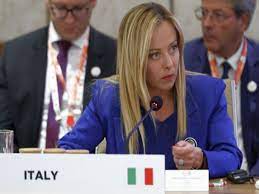Italy’s Meloni complains to Scholz over migrant NGO funds

Rome: Italy’s Prime Minister Giorgia Meloni wrote a letter of complaint to German chancellor Olaf Scholz over the weekend, protesting the government in Berlin’s plans to finance two migrant NGOs operating in Italy.
“I have learned with astonishment that your administration — without coordinating with the Italian government — has allegedly decided to support with substantial funds non-governmental organizations engaged in the reception of irregular migrants on Italian territory and in rescues in the Mediterranean Sea,” Meloni wrote to Scholz.
The private letter was dated September 23, but Italy’s government appeared to make it public on Monday, with it appearing in various local media including newspaper La Stampa. Italian Defense Minister Guido Crosetto had also taken aim at the policy in an interview with La Stampa published on Sunday.

Meloni’s right-wing populist Brothers of Italy party campaigned on a tough line on immigration and the Italian prime minister admitted over the weekend — almost exactly a year after her election win — that she had hoped to do “better” in this regard. High numbers of new arrivals on the Italian Mediterranean island of Lampedusa in recent weeks have put authorities in Italy under strain and thrust the issue back towards the front pages.
A spokesman for Germany’s Foreign Ministry had announced the new policy on Friday, saying that two charities had already been approved for support.
One focuses on assistance on land, and the other — SOS Humanity — on rescuing people in small people smugglers’ boats at sea. The approved grants for each were to be comparatively modest, between €400,000 (roughly $425,000) and €800,000 each, the spokesman said.
The ministry described rescuing people at sea as a “legal, humanitarian and moral duty.”
So far this year, Italy has recorded some 133,000 people coming ashore, mainly from North African countries like Libya and Tunisia. That compares with just under 70,000 in the same period last year.
Meloni last week signed off on new measures to lengthen the time migrants can be detained and to increase the number of available detention centers, hoping to dissuade people from setting sail for Italy.
Italy has also tried to stop several migrant rescue NGO vessels from docking and the government in Rome argues that the boats’ activities can act as a “pull factor” for migrants to set sail for Europe, a claim the NGOs themselves reject.
“I believe that the efforts, including financial, of EU nations interested in providing concrete support to Italy should rather focus on building structural solutions to the migration phenomenon,” Meloni wrote in her letter to Scholz.
The search and rescue organization SOS Humanity carried out four more rescues in international waters close to the Italian island of Lampedusa. The search and rescue organization SOS Humanity carried out four more rescues in international waters close to the Italian island of Lampedusa.
SOS Humanity has been operating off Lampedusa and looks set for some German government fundsImage: Raphael Schumacher/ SOS Humanity
She cited cooperation with EU projects working in collaboration with transit countries, such as the recent deal with Tunisia, as one such structural solution.
She also said Germany should focus on assisting migrants on its own soil.
The prime minister concluded by inviting Scholz to discuss the issue “at the first available opportunity.”
Trying month for German-Italian migration cooperation
Migration has been a sore topic between Berlin and Rome through most of September.
Earlier in the month, amid the record numbers arriving on Lampedusa, Germany suspended its participation in a voluntary EU scheme under which it was taking some asylum-seekers from Italy.
Berlin said it was halting the scheme temporarily because Meloni’s government had all-but stopped taking back those migrants who Germany believed Italy should take under current EU rules.
Last week, German President Frank-Walter Steinmeier had tried to mend some fences, visiting Sicily with his Italian counterpart Sergio Mattarella. In that meeting, the two leaders — both in rather more apolitical positions than Meloni and Scholz — focused on a combined appeal for improvement in chaos-ridden Libya, one of the main launching points for the human traffickers.
Steinmeier had said during that visit that both Italy and Germany were at their limits in terms of what they could accommodate and lobbied for a new EU deal on migration that shared the burden more evenly between all member states. He called the existing rules “pre-historic” and no longer fit for purpose, having been penned before the era of mass migration and the onset of other accelertaing factors like climate change.
A bid to reform EU migration and asylum policy is ongoing in Brussels at present, but progress is as slow and difficult as usual as the 27 members and governments — often with very different demographics and migration policies — seek a compromise they can all sign.





